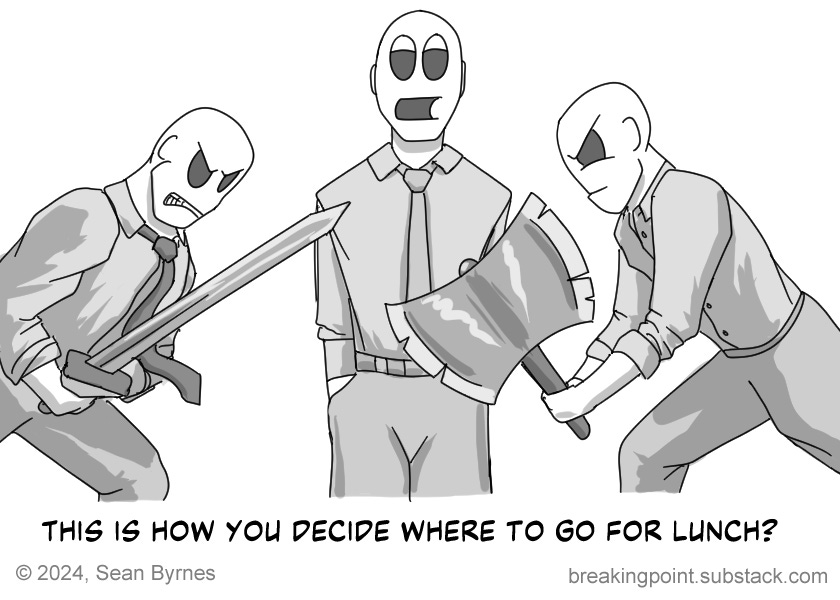Stop Arguing, Start Debating
The difference between debating and arguing is the difference between success and failure.
In the early days of developing an idea, it is critical that you challenge every assumption behind that idea. That kind of questioning will either make the idea stronger and more crisp, or it will tear down its facade and reveal that there was nothing behind it. That is easier said than done! We all love our own ideas, and it can feel personal when flaws are found.
As a result it is tempting, when first assembling your team, to surround yourself with people that are just like you. These people share your interests, your sense of humor and your passions so it makes it easy to get along and agree on ideas. An environment where your team is universally similar in almost every way is known as a monoculture and it poses a serious danger: If everyone agrees with you, who will challenge your bad ideas?
At the same time, you cannot afford to waste the limited time and effort you have with endless arguments about ideas and strategy. Monocultures are bad, but teams that are fighting about every little decision are no better. Velocity dies if you have to question every step you take.
After questioning your idea and evaluating it objectively, your team needs to be able to make a decision and move on. I call this the difference between debating and arguing.
You want to debate and not argue, and here is how you can tell the difference.:
Debating (Good)
People come prepared to a discussion on the issue with background and well thought out explanations for their opinion.
There is a decision making framework that is used to evaluate all options.
People leave the discussion(s) having either changed their minds or compromised on a clear solution.
There are consistent retrospectives to evaluate decisions and whether they were correct.
Arguing (Bad)
You discuss the same issue at least 3 times with no clear progress.
You leave discussions about the issue with no clear agreement and everyone still married to the ideas that they had when they entered.
Side discussions start to erupt among factions with different points of view that don’t include people with differing opinions.
There is no objective framework for making a decision, or to evaluate if the decision was correct. Instead, decisions are constantly revisited with the same reasoning again and again.
Using these definitions, debating allows you to move quickly to handle issues with a reliable process. Arguing drains energy away from your goals by having everyone focus on the argument instead of on the strategy.
In many companies, the CEO prevents the team from falling into the trap of arguing by making decisions themselves by executive decree. Sometimes that is necessary and there is a reason that CEOs exist. However, if you find yourself having to use the CEO stick often you will prevent your team from developing decision making skills and stunt the maturity of your organization. Empowering your team to debate issues and then decide will scale with your company as you grow.
Monitoring whether your team is debating or arguing is an important way to gauge how well your team is working. If you spend a lot of time arguing, it’s time to make a change.
For more on Corporate Culture and Team Dynamics, see:


